Premium Only Content
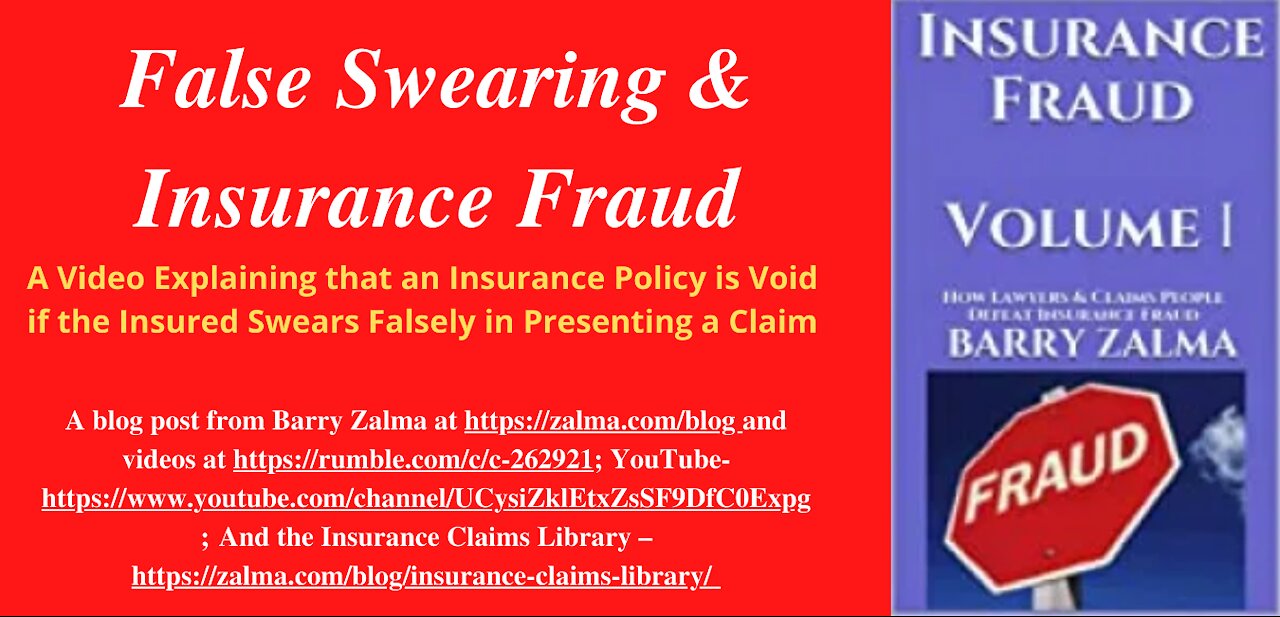
A Video Explaining that an Insurance Policy is Void if the Insured Swears Falsely
False Swearing & Insurance Fraud
In common language the “false swearing” provision of an insurance policy merely means that if the insured lies under oath the policy is void whether the lie is in a proof of loss or at an examination under oath. In Texas and Oklahoma, false swearing is explained this way:
Where an insured knowingly and willfully overestimates the value of property destroyed or damaged, the policy is voided and the insured’s right to recover is defeated.
The reason for the false swearing defense can be explained because it would be unjust to allow a claimant to misrepresent facts under oath that might lead to a valid defense and then allow him to escape the consequences of the falsehood simply because he had succeeded so well that the company was unable to establish the defense.
In common language the "false swearing" provision of an insurance policy merely relates to a lie under oath.
In Texas and Oklahoma, false swearing is explained this way: "Where an insured knowingly and willfully overestimates the value of property destroyed or damaged, the policy is voided and the insured's right to recover is defeated."[Summit Machine Tool Manufacturing Corp. v. Great Northern Insurance Co., 997 S.W.2d 840 (Tex. App. Dist. 3, 1999)].
Almost every policy that insures against the risk of loss of property requires the insured to submit a sworn proof of loss. The proof of loss must provide complete details regarding the property insured, the origin of the loss, and the value of the property claimed destroyed. A policy usually also requires the insured to give the insurer access to books and records to prove the claim. Where fraud is suspected, the insurer may demand that the insured be examined under oath. Significant deviations between the sworn proof of loss and the facts developed at an examination under oath can be the basis of a defense of fraud or false swearing. If false swearing is found to exist, it will normally constitute a complete defense to any claim under a property insurance policy.
The U.S. Supreme Court stated the rule, as follows:
A false answer as to any matter of fact material to the inquiry, knowingly and willfully made, with an intent to deceive the insurer, would be fraudulent. If it accomplished its result, it would be a fraud effected; if failed, it would be a fraud attempted. No one can be permitted to say, in respect to his own statements upon a material matter, that he did not expect to be believed; their materiality, in the eye of the law, consists in their tendency to influence the conduct of the party who has an interest in them and to whom they are addressed. Claflin v. Commonwealth Insurance Co., 110 U.S. 81, 3 S. Ct. 507, 28 L. Ed. 76 (1884).
© 2021 – Barry Zalma
Barry Zalma, Esq., CFE, now limits his practice to service as an insurance consultant specializing in insurance coverage, insurance claims handling, insurance bad faith and insurance fraud almost equally for insurers and policyholders.
He also serves as an arbitrator or mediator for insurance related disputes. He practiced law in California for more than 44 years as an insurance coverage and claims handling lawyer and more than 54 years in the insurance business.
He is available at http://www.zalma.com and zalma@zalma.com. Mr. Zalma is the first recipient of the first annual Claims Magazine/ACE Legend Award. Over the last 53 years Barry Zalma has dedicated his life to insurance, insurance claims and the need to defeat insurance fraud. He has created the following library of books and other materials to make it possible for insurers and their claims staff to become insurance claims professionals.
Go to the podcast Zalma On Insurance at https://anchor.fm/barry-zalma; Follow Mr. Zalma on Twitter at https://twitter.com/bzalma; Go to Barry Zalma videos at Rumble.com at https://rumble.com/c/c-262921; Go to Barry Zalma on YouTube- https://www.youtube.com/channel/UCysiZklEtxZsSF9DfC0Expg; Go to the Insurance Claims Library – https://zalma.com/blog/insurance-claims-library/ The last two issues of ZIFL are available at https://zalma.com/zalmas-insurance-fraud-letter-2/ podcast now available at https://podcasts.apple.com/us/podcast/zalma-on-insurance/id1509583809?uo=4
-
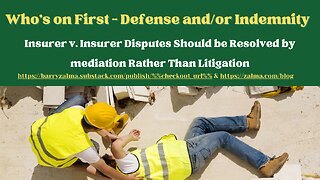 10:17
10:17
Barry Zalma, Inc. on Insurance Law
1 year agoWho's on First - Defense and/or Indemnity
191 -
 13:20
13:20
Barry Zalma, Inc. on Insurance Law
4 years agoA Video Explaining Setting Insurance Reserves
134 -
 15:06
15:06
Barry Zalma, Inc. on Insurance Law
4 years agoA Video Explaining Voiding an Insurance Policy for Breach of Warranty
98 -
 16:40
16:40
Barry Zalma, Inc. on Insurance Law
4 years agoA Video Explaining the Burden Imposed on a First Party Property Insurance Insured
187 -
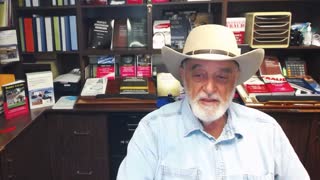 13:00
13:00
Barry Zalma, Inc. on Insurance Law
3 years agoA Video Explaining the Contractual Right of an Insurer to Declare a Policy Void
71 -
 16:33
16:33
Barry Zalma, Inc. on Insurance Law
4 years agoA Video Explaining How to Read Your Homeowners Insurance Policy
148 -
 16:51
16:51
Barry Zalma, Inc. on Insurance Law
4 years agoA Video Explaining the Structure of Insurance
122 -
 16:54
16:54
Barry Zalma, Inc. on Insurance Law
4 years agoA Video Explaining How to Discover and Defeat Insurance Fraud
146 -
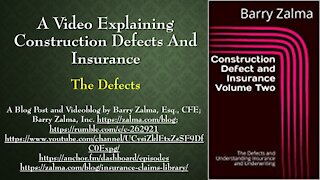 15:47
15:47
Barry Zalma, Inc. on Insurance Law
4 years agoA Video Explaining Construction Defects and Insurance
41 -
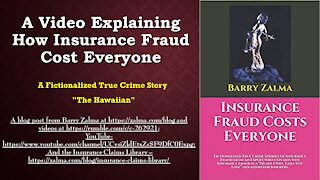 17:10
17:10
Barry Zalma, Inc. on Insurance Law
4 years agoA Video Explaining How insurance Fraud Cost Everyone
39